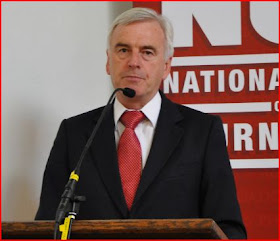
MPs John McDonnell (top) and Austin Mitchell are urging Lord Leveson, who is heading the inquiry into media ethics, to recommend legislation for a "conscience clause" for journalists which would stop them being sacked for refusing to break the code of conduct.
In a letter to the Guardian today the MPs, both members of the NUJ parliamentary group, state: "On several occasions over recent years, we have proposed amendments to employment legislation to introduce a conscience clause to protect journalists who refuse to undertake editors or press owners' instructions to do anything against the journalists' code of conduct. This would help protect journalists who refused to stoop to practices which they regard as unethical.
"When the Employment Relations Act was going through parliament in 2004, we sought to introduce a conscience clause amendment which would have ensured that any attempt to dismiss a journalist for obeying the Press Complaints Commission code of practice would have been unlawful and therefore actionable in respect of compensation.
"All the main parties refused to support our amendments. Giving the code of conduct statutory force would help protect journalists against undue pressure from editors, and also prevent the development of a sewer journalism culture. Our hope is that the Leveson inquiry will recommend legislation to introduce a conscience clause."
Speaking in the Commons on the Leveson inquiry, McDonnell pointed out that the NUJ code was first development in 1936.
Asked if the one of the most important results of the Levenson inquiry would be "a media that tells the truth", McDonnell replied: “I think that we will arrive at that situation only if we enforce the code of conduct and if journalists and employers know where they stand and that, if they breach the code, journalists can stand up and be protected in law if they refuse to practise the sort of journalism we have seen recently.
"I urge the Leveson inquiry to examine the introduction of a conscience clause backed by statute to protect journalists who refuse to go into the sewer and use the methods that we have all condemned in these recent debates.
"The Leveson inquiry should consider anti-trade union legislation, which has been used to undermine employees’ rights at places such as News International when unions have tried to protect members who have simply stood up for quality and ethical journalism.”
Local press and Leveson Inquiry:
The Prime Minister referred to the “strong case for recognising the importance of a strong regional and local newspaper industry”, avoiding “punishing the innocent.. providing good local newspapers” and the work of the local press with the police to help beat crime, in the course of Wednesday’s debate on Public Confidence in the Media and Police.
David Rutley (Macclesfield) (Con) asked : “Like many other Members, I am sure, I have been contacted by local newspapers which are concerned about the prospect of new regulation at a time of increasing pressure on their circulation. Can my right hon. Friend assure them that new regulations will not be overly heavy-handed on local press?”
The Prime Minister replied: “My hon. Friend makes a good point. We do not want a new regulatory system to punish the innocent, as it were, who are just providing good local newspapers, but there are problems with ethics and issues that need to be looked at. We need to make sure that it is proportionate….”
Nigel Mills (Amber Valley) (Con) asked: “After a decade of spin, I welcome the Prime Minister’s attempt to sort out the relationship between politicians and the media for the long term, not just to manage the news cycle. Will he recommend that Government Departments, local councils and quangos start dispensing with all their own spin doctors so that we can be truly rid of that spin culture?”
The Prime Minister replied: “My hon. Friend makes a good point. An enormous amount of money is still spent by local authorities on their own free local newspapers. That is injurious to the newspaper industry. There is a strong case for recognising the importance of a strong regional and local newspaper industry….”
- Pic: Jon Slattery
No comments:
Post a Comment